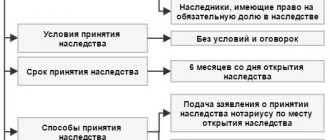Intestate inheritance after the death of a brother
Inheritance by law is based on the relationship between the deceased and the recipient of the property. The order of transfer of rights is divided into lines of kinship.
Brothers and sisters are heirs of the second stage.
That is, they can claim a share in the property of the deceased only if all the heirs of the first priority refused the inheritance, missed the deadline for registration, did not begin to formalize it, or they simply do not exist.
The key to inheritance is confirmation of family ties. That is, in order to receive an inheritance after the death of a brother, it is necessary to document this fact.
So, for the purpose of receiving an inheritance, a brother or sister of the deceased is considered by law to be a child of one of the parents of the deceased. Moreover, the father or mother of the testator had to establish a family relationship with him through the registry office. Thus, not only blood, but also adopted children of common parents fall into the category of brothers and sisters.
Direct heirs after the death of a brother
In the event of the death of a brother, the heirs of the first priority according to law are:
- Mother and father. The exception is the situation when parents were deprived of parental rights in court and did not restore them until the child turned 18 years old.
- Children and grandchildren (natural and adopted). If the brother's child died before his death, then the right to the share passes to the grandchildren of the deceased. A prerequisite is the establishment of an official relationship. If the deceased parent did not register the relationship in the registry office, then paternity (maternity) will have to be confirmed posthumously through the court.
- Official wife. The right to inheritance remains with the spouse from the moment of registration of marriage until the moment of registration of divorce.
- Disabled dependents. Minors and disabled relatives or strangers who lived with the deceased and were supported by him for more than 1 year can also claim a share in the property on an equal basis with their closest relatives.
Each of the heirs by law has the right to an equal share of the inheritance. That is, all property is divided equally between all relatives who have declared their rights to the notary.
Step-siblings
Half-siblings are children who share only one parent in common. They are endowed with all the rights and responsibilities of full brothers and sisters.
To receive an inheritance, it is necessary that the relationship of each child with a common parent be confirmed in the registry office.
Example No. 1. In his first marriage, Ilya had a daughter, Valentina. In the second - son Sergei. Since the children were born in an official marriage, Ilya was listed as the father in the registry office.
Accordingly, Sergey and Valentina are half-brother and sister and have the right to inheritance in the event of the death of one of them (if there are no first-line heirs).
Example No. 2. In marriage, Victor had a daughter, Ulyana. After the divorce, the man cohabited with Irina without registering his marriage. They had a girl, Sasha. The man did not register paternity.
Accordingly, Ulyana and Sasha are actually half-sisters, but officially have no right to each other’s inheritance.
Dependent's share
A brother or sister may be included in the first-degree heirs if they were recognized as dependents of the deceased. To be considered a dependent, a brother or sister must:
- be a minor, disabled or pensioner;
- be supported by a deceased brother or sister for more than 1 year.
They do not have to live together for 1 year. It is enough to present evidence that the deceased regularly transferred funds or bring a witness who will prove that the deceased regularly brought food and bought clothes.
To receive a share as a dependent through a notary, it is necessary to present an order appointing guardianship, that is, the heir must be under the guardianship of the testator.
In other cases, confirmation of being in custody can only be done through the court.
Take the survey and a lawyer will share an inheritance action plan in your case for free
You might find it useful:
State duty calculator for inheritance
Samples of inheritance documents
Consultation with a lawyer on inheritance
What line of succession do nephews belong to?
Sometimes it happens that a person’s father or mother was at one time deprived of parental rights and did not raise him. Such parents cannot claim the property of their adult children.
Please note: the law protects the interests of parents who have fulfilled their duty, but are offended by their children: if the testator did not include in the will the father or mother who lost their ability to work, they will in any case receive an obligatory share of the inheritance.
The order of inheritance by law becomes relevant in one of the following cases:
- when there is no will,
- when there is a part of the property that is not included in it,
- when one of the heirs wrote a refusal to enter into an inheritance.
Then the inheritance procedure established by law begins to apply. The queue number of heirs indicates the nature of family ties with the deceased. In the absence of priority applicants, the right to the property of the deceased is received by his relatives from the 2nd to 4th priority:
- brothers and sisters,
- uncles and aunts,
- grandfathers and great-grandfathers.
Then comes the turn for cousins (5th and 6th stages) and stepsons/stepdaughters or stepmother/stepfather (7th stage). Finally, the last, 8th stage has no blood ties with the testator, and the basis for inheritance is living together with him as his dependent for a period of at least a year.
The order based on the degree of relationship is “violated” due to certain circumstances by certain groups of heirs. The law gives them special privileges or denies them inheritance rights.
Groups of heirs by presentation are available in the first three lines. These are children representing their parent, who is no longer alive at the time the inheritance is opened.
- If the son or daughter of the testator dies before the distribution of the inheritance, their children, who are the grandchildren of the deceased, inherit.
- The nephews of the testator represent his brother/sister in the eyes of the law, who would have inherited in second place during their lifetime.
- Cousins have the right to represent the uncle/aunt of the deceased among the heirs of the 3rd stage.
The share of the deceased heir is distributed equally among his descendants.
Distant relatives of the deceased may be among the main heirs if they receive the status of dependents during his lifetime. These are elderly people, children under 18 years of age, and disabled people.
To receive their share along with close relatives, they must submit certificates of their incapacity for work and prove the fact of living with the testator for at least 1 year before his death.
If he has no other relatives, dependents can receive all the property as heirs of the 8th stage.
1. The commented article lists the types of heirs of the third, fourth and fifth degrees of kinship, and also provides a legal definition of the degree of kinship.
2. In all cases listed in paragraph 2 of the commented article, there must be a confirmed blood relationship between the testator and the categories of heirs indicated therein.
3. As follows from paragraph 3 of the commented article, if there are no heirs of all the previous orders specified in the law, the stepsons, stepdaughters, stepfather and stepmother of the testator are called upon by law to inherit as heirs of the seventh order. Thus, the law allows the possibility of inheritance by law for persons who are neither relatives nor spouses of the testator.
Paragraph 29 of the Resolution of the Plenum of the Supreme Court of the Russian Federation dated May 29, 2012 No. 9 “On judicial practice in inheritance cases” defines the circle of persons who are considered stepsons, stepdaughters, stepfathers and stepmothers of the testator. Thus, the stepsons and stepdaughters of the testator are the children of his spouse who were not adopted by the testator, regardless of their age. The stepfather and stepmother of the testator are the spouse of his parent who did not adopt the testator.
These persons are also called upon to inherit if the marriage of the parent of a stepson, stepdaughter with the testator, as well as the marriage of a stepfather, stepmother with the parent of the testator was terminated before the opening of the inheritance due to the death or declaration of death of the spouse who was respectively the parent of the stepson, stepdaughter or parent testator. In cases where the marriage is terminated by dissolution, and also declared invalid, specified in paragraph 3 of Art. 1145 of the Civil Code of the Russian Federation, persons are not called upon to inherit (clause 29 of the Resolution of the Plenum of the Supreme Court of the Russian Federation of May 29, 2012 No. 9 “On judicial practice in inheritance cases”).
How to receive an inheritance under a will after the death of a brother?
To become an heir under a will after the death of a brother, you do not need to confirm your relationship. If the heir is indicated in the will, then it does not matter whether the relationship is properly established.
However, when paying the state fee to a notary, brothers and sisters have a benefit. They pay 0.3% of the value of the property received. While other recipients pay 0.6% of the value of the inheritance.
To take advantage of the benefit, the heir must present documents confirming the relationship. Thus, if documents are missing, the heir cannot take advantage of the benefit. But this does not deprive him of the right to receive inherited property as a whole.
According to the will, the brother receives the share that the testator assigned to him. It can be either more or less than required by law.
Availability of a mandatory share
A brother may claim a mandatory share in the following cases:
- at the time of the deceased's death he had been under his care for 1 year;
- at the time of the deceased's death he was incapacitated and was supported by him.
As a compulsory heir, the brother can claim ½ of the share that he would have received without a will.
Terms and time of entry into inheritance under a will after the death of the testator
Does an ex-wife have the right to inherit after the death of her ex-husband?
Article 1145 of the Civil Code of the Russian Federation. Heirs of subsequent queues (current edition)
Carrying out the protection of the rights of unprotected categories of persons, the legislator has provided a list of heirs, among whom are noted the children of the deceased who have not reached the age of majority, as well as by age. All of these persons are dependents of the testator.
Even if there is a will that does not contain instructions for the transfer of property to specified persons, the listed heirs will receive their obligatory share, determined by law or court decision.
Example. Citizen S. drew up a will, according to the terms of which he transfers 5 million rubles belonging to him, as an inheritance, to his cousin K. Citizen S. was divorced. From his marriage he had a minor son, I. As a person who is a compulsory heir, I. will receive 2.5 million rubles, i.e. half of the entire inheritance that would be due to him on the basis of law. Taking into account the formal approach, it can be established that I. is the son of S., i.e. refers to the primary heirs. Having a will in K.'s name will allow I. to receive only half the amount.
The legislation provides for the possibility of inheriting property, which, in accordance with Art. 1146 of the Civil Code occurs if the heir before the death of the testator occurs. Similar rules apply if they die at the same time.
The right of representation allows the descendants of an heir to inherit for him. The emergence of this right is possible only among the descendants of heirs classified as.
The list of persons acting as heirs by nomination is fixed by law and is divided into:
- first category: grandchildren who are the children of the main heir;
- second category: nephew and niece through a half or full brother or sister;
- third category: cousins.
Heirs called by right of representation cannot count on receiving property:
- included in the compulsory share of the testator's dependents;
- which could have been received by the disinherited heir.
The order of succession by law applies in the following cases:
- there is no will;
- there is a will, but it is declared invalid;
- there is a share in the testator’s property that he does not mention in his will;
- a citizen has the right to an obligatory share, which is also not provided for by the will;
- recognition of the heir as unworthy;
- the heir under the will refused the inheritance.
Taking into account the above reasons, inheritance by law can be formalized both in the absence of a will and in the presence of one. This makes the question of priority and order of inheritance relevant.
The period for entering into inheritance is the same for all queues and is six months.
Inheritance by law implies seven lines, formed on the basis of family and marriage ties. The procedure for receiving an inheritance implies the following sequence :
- in the absence of a will, property is inherited first;
- if there are no recipients in the first circle, the notary looks for heirs of the second circle;
- in the absence of heirs of the second stage, the third circle is revealed and so on;
- If the deceased does not have a single heir, the property goes to the state.
Within one circle, heirs have equal rights to property. For example, if 6 recipients of the first priority inheritance are identified, the property is divided into 6 equal parts. The heirs of the second and other stages receive nothing.
The heirs of the first stage are:
- children of the testator;
- spouse if there is state registration of marriage;
- parents, if they have not been deprived of parental rights.
In relation to the children of the deceased, their equal status is emphasized. Those born in marriage, out of wedlock, adopted - they all have the right to receive their share of the inheritance. It remains the same even if the testator was deprived of parental rights.
By hereditary transmission
The parents of the deceased are the heirs of the first stage. But if the parent dies within 6 months after the death of the child, without having time to submit an application to the notary for acceptance of the inheritance, then the share of the deceased child passes to the heirs of the parent through hereditary transmission.
That is, if the brother died, and the mother or father did not apply to the notary and also died, then the share intended for the deceased parent will go to the brother or sister.
Example. Oksana was supposed to inherit after the death of her son, Gennady. But the woman took the loss of her son hard, fell ill and died. Gennady's inheritance was to be divided between Oksana and his daughter. Since the mother died before accepting her son’s property, her share passed to her daughter Olga. Thus, Gennady’s inheritance was divided between his daughter and sister, ½ share each.
Are you tired of reading? We’ll tell you over the phone and answer your questions.
How to enter into an inheritance after the death of a brother?
In order to obtain rights to the brother’s property, it is necessary to accept the inheritance within the period provided for this. You can accept an inheritance:
- actually;
- through a notary.
Let's look at each procedure in more detail.
Actually
Art. 1152 of the Civil Code of the Russian Federation provides for the possibility of accepting an inheritance without official registration. It is enough for the heir to use the property of the deceased brother for its intended purpose: live in an apartment, cultivate a summer cottage, carry out repairs, pay rent or a loan.
Note! The action must be carried out within the period established for accepting the inheritance.
However, upon actual acceptance of the inheritance, the successor can only use the property. He is unable to sell or rent it out because he does not have title documents. At the same time, you can register ownership at any convenient time. It is enough to collect evidence of inheritance and contact a notary or court.
But in fact, you can enter into an inheritance after the death of your brother under a will or in the absence of first-line heirs. You cannot take property and use it if the period for another line of heirs to enter into inheritance continues during the current period.
Through a notary
Another option for entering into inheritance is the notarial method. In this case, the heir visits the notary office at the place of registration of the deceased brother.
As a result, the heir receives a certificate of inheritance rights. This is a document of title that makes it possible to re-register ownership of inherited property in your name. From the moment of re-registration, the heir becomes the full owner of the property.
The advantage of this option is the receipt of supporting documents for the property. Other heirs will not be able to claim it.
The disadvantages include the high cost of re-registration. In the process of receiving an inheritance, the successor will have to pay a large amount.
Algorithm of actions:
- Preparation of documents for a notary.
- Payment of state duty.
- Submitting an application.
- Obtaining a certificate of inheritance rights.
If the brother can confirm his relationship, then he pays a fee of 0.3% of the value of the property received. If supporting documents are lost or a family connection is not established (in case of inheritance under a will), then the duty will be 0.6% of the value of the inheritance.
What documents are needed?
Before contacting a notary, you must prepare documents that confirm your relationship. In case of inheriting a brother's property, the heir must present:
- your birth certificate;
- birth certificate of the deceased;
- parent's marriage certificate (if the parent changed his last name during marriage);
- certificates of change of surname or marriage of the heir and testator (if available).
List of documents for the notary:
- passport;
- will;
- death certificate of the deceased brother;
- certificate of last place of registration;
- receipt of payment of state duty;
- appraisal report on the deceased's property;
- certificates of cadastral value for real estate included in the inheritance;
- title document for property (purchase and sale agreement, privatization, exchange, gift);
- extracts from the Unified State Register of Real Estate for each property owned by the brother.
To calculate the state duty on all movable property of the deceased, an assessment is carried out. To do this, you need to contact a specialized company that has a license to carry out assessment work.
The notary must prepare an application for acceptance of the inheritance and the issuance of a certificate of inheritance rights. In order not to pay a notary fee for preparing a draft application, it is advisable to write it yourself.
Deadlines
Brothers enter into inheritance at the following times:
- According to the will. Within 6 months from the date of death of the testator.
- According to the law, if there are heirs of the first priority. Within 6 months from the moment they are recognized as unworthy or formally refuse the inheritance.
- According to the law, if there are heirs of the first priority, but they did not apply to the notary or missed the deadline. Within 3 months from the date of expiration of the 6-month period for entry into inheritance for first-degree successors.
- By hereditary transmission. During the general period - if the parent died within 3 months after the death of the deceased child. If the parent died 3 months after the death of the child, then the brother must register the inheritance within 3 months after the death of the parent.
Cousins and heirs of what order
The heirs of the second stage are:
- siblings and half-brothers;
- grandparents for each parent.
In the first case, the equal status of all brothers and sisters is also implied. For kinship and the corresponding receipt of inheritance, it is enough to have one common parent.
Grandparents inherit on equal terms with brothers and sisters. If the testator was adopted, then the parents of the adoptive parent also have the right to receive property.
In the absence of persons of the first and second priority, the right to inheritance passes in the following order:
- third line - aunts and uncles, cousins;
- fourth - great-grandparents;
- fifth - cousins of the testator, as well as great-uncles and grandmothers;
- sixth - great-grandchildren, cousins and aunts;
- the seventh stage gives the right of inheritance to relatives without blood ties - stepmother and stepfather, stepson, stepdaughter.
The right of representation is the ability to obtain the right to inheritance from parents. This situation arises when the heir dies before or at the same time as the testator. In this situation, the children of the heir receive the property.
The right of representation also takes into account the priority and is calculated only for the first three categories of persons. In this question, the following sequence is distinguished:
- grandchildren of the deceased - in the event of the premature death of children, they become first-degree heirs;
- nephews or nieces inherit through siblings and full brothers and sisters;
- cousins receive an inheritance instead of an aunt or uncle.
It is emphasized that by right of representation only the property to which the deceased heir has the right is inherited. If he is found unworthy, the right of representation does not apply.
This queue in the legislation includes spouses, parents and children. Despite the simplicity of determining the heirs in this case, there are several nuances that must be taken into account in such a situation, as there are common misconceptions about this.
- Spouses can be considered first-priority heirs only if they have an officially registered marriage. The current concept of “civil marriage” or cohabitation is not provided for by law. Thus, an unofficial spouse can be considered an heir solely by will or if he was officially dependent on the deceased for a year, while being disabled - due to health reasons or age. Age-related disability begins at age sixty for men and at age fifty-five for women.
- The parents of the deceased have equal rights regarding their children, including in cases where the marriage was dissolved. At the same time, if parental rights were deprived in court and were not restored, the right to inheritance also does not exist. However, guardians in the absence of kinship, step-parents and children are in the seventh - penultimate line of inheritance and do not have the right to enter into inheritance on a general basis, with the exception of dependent status in case of disability.
To receive an inheritance, children must have a certified origin in accordance with the RF IC procedure.
At the same time, they are obliged to have the right to inherit property - that is, not to be recognized in court as unworthy heirs. Step-children who are able to work do not belong to the first line of inheritance.
Also, children born from the deceased within three hundred days after the opening of the inheritance are considered to be the heirs of the first stage.
Theoretically, if you choose the right line of heirs and confirm your right with documents, the path to receiving an inheritance will be short. However, the heir may not always receive his share of the property.
To paraphrase the classic, we can say that a person is suddenly mortal, and therefore cannot always enjoy the wealth that he received after the death of a relative. However, he has his own successors, they have theirs, and so on. Therefore, legal systems regulate relations regarding the transfer of inheritance rights from line to line.
Everyone who can participate in the division of property after the death of a person is encouraged to receive material and non-material benefits in turn. In this case, subsequent ones inherit only if there are no previous ones. That is, the first line always has the opportunity to receive something, the second - if there is no first, the third - if there is neither the first nor the second, and so on.
The order of entry into inheritance during inheritance is strictly observed by law and can be defended in court.
Within one queue, the shares in the inheritance of all those on the queue are equal.
If there is more than one heir, they receive a formal share in the property, that is, expressed as a percentage without allocation in kind (for example, 30% in a property, 1/8 of a car).
By agreement among themselves, successors can distribute property so that everyone receives a separate thing or object.
When inheriting by law, it is very important to correctly establish the nature of the relationship between the deceased and potential successors. Confirmation of kinship for inheritance under a will is of extremely little importance (successors are indicated in the document without reference to family relations), but for receiving material benefits without the last will, it is decisive.
The first person who is faced with the need to recreate the family tree of the testator is the notary who opens the inheritance case. At this stage of the inheritance process, documentary confirmation of family ties occurs.
An exclusive list of documents that applicants must provide to a notary is not established by law. And this is not surprising - there are so many situations, so many options for confirmation.
In order to confirm relationship, documents are required. At the same time, for a notary, as a person who issues certificates of inheritance to heirs by law, only indisputable documents of the form established by law are important. That is, the matrimonial relationship is confirmed by a marriage certificate, the parental relationship is confirmed by a birth or adoption certificate, etc.
Lost documents can be replaced with duplicates if they can still be obtained from the authority that issued the original.
If there are no such documents or they have inconsistencies (for example, the letters in the surname are different), then the notary’s office will deny you the opportunity to be considered a successor and will offer to go to court.
How is the inheritance divided after the death of a brother?
The procedure for dividing inheritance under a will:
- The shares are determined by the testator. In this case, each heir receives a part of the property established by the owner when drawing up the will.
- The shares were not determined. In such a situation, all property is divided among all heirs specified in the will in equal shares.
- Obligatory heir. The minimum share cannot be less than 1/2 share of the share provided by law.
The procedure for dividing property according to law:
- In the general order (as heirs of the 2nd stage or dependents). The property is divided among all recipients of one queue in equal shares.
- By hereditary transmission. Brothers and sisters share equally the share due to the deceased parent. And the legal successors of the first stage each receive a share.
Inheritance law
The closed will in a sealed envelope is handed over by the testator to the notary in the presence of two witnesses who sign the envelope. The envelope signed by the witnesses is sealed in their presence by a notary in another envelope, on which the notary makes an inscription containing information about the testator from whom the closed will was accepted by the notary, the place and date of its acceptance, surname, first name, patronymic and place of residence of each witness in accordance with the identity document.
Lawyer's answers to private questions
My brother has a daughter. He divorced his wife 10 years ago. All this time he lived with my family. I am his only sister, my parents died. He was sick, we looked after him. Now he is dead. And his daughter filed documents for inheritance. Can I claim his property?
As a sister, you cannot claim the inheritance since you have a daughter. The only option is to recognize the daughter as an unworthy heir. This is possible if alimony was collected from her for the maintenance of her father, but she did not pay.
My brother died. Can I claim his property without a will if he only has an official wife. They had no children.
No. In this situation, the wife inherits all the property as the heir of the first turn.
My brother died a month ago. Every month he transferred money to me for medicine (I have a group 2 disability, my pension is not enough for medicine). The father will enter into the inheritance as the only heir of the first stage. But my father abandoned us many years ago. Can I receive an inheritance instead?
You need to go to court and recognize yourself as a dependent of the deceased. In this case, all property will be divided between you and your father in ½ share.
My brother made a will for me. His wife wants to contest the will. Will I be able to claim an inheritance if the will is declared invalid?
No. In this case, the inheritance will go to the wife of the deceased.
My husband died 2 months ago. He has a brother on his father's side. Can he claim the inheritance?
The brother is the heir of the second stage. If there are children, a wife and parents, then they are the first to claim the inheritance.
My brother had a car loan. After his death, the bank constantly calls me and demands money. But the brother's children received the inheritance. Can the bank claim the debt from me?
After the death of the debtor, the debt is paid off by his heirs. In this situation, the children of the deceased.
Heirs of the first stage without a will
Hello. My mother lived in another city, after retirement she decided to move in with her son, they once lived together. But he didn't want to take her. And I took her. I sold an apartment there and bought one in my city. She looked after her completely. Her legs hurt, she couldn’t walk. I did repairs, did laundry, cleaned, carried groceries. She achieved the status of a widow of a war participant (her father was a participant), they changed her plumbing and replaced her windows. In general, I lived clean and warm. She didn't complain about anything except her legs. She was 87 years old. She lived with me for 19 years and then my brother persuaded her to go to him. They didn't tell me anything. I guessed it myself later. He stopped communicating with me. She found fault with me, brought me to tears, and we often began to quarrel. She left in good condition. She was normal there for a year, and then both he and she hid the fact that she was in poor condition. She gave him power of attorney to sell the apartment. And he arrived spontaneously. No one knew. That day I accidentally arrived at the apartment, I couldn’t get in, then my brother opened the door and attacked me, beat me, I lost consciousness. They called an ambulance. A criminal case was opened and they gave me a suspended sentence. She turned 90 and died. My daughter-in-law wrote that the doctors said she had intoxication throughout her entire body. The money was in her savings book. She very carefully took medications only for blood pressure. Why the poisoning? He seemed to be baiting her, because the power of attorney could become invalid. I submitted documents for the inheritance, but it was no longer there, he managed to withdraw it. And I didn't receive anything. How can I take my share?
We recommend reading: What Documents Are Needed to Buy a House with Maternity Capital








